Sixty Years Later
by Steve Brazier
Some people love reunions, some would not be seen dead at one. When I was phoning round
canvassing support for the 1998 reunion for Muni pupils who began in 1958, I
heard the negative side of the argument. I did get off on the wrong foot - forgetting
my old classmate's first name. But he was already irritated at being chased up after
my initial letter inviting him to attend. "Do you think", he said,
"that I would enjoy the smug ramblings of all of you who have done well and prospered over the
last forty years?". I guess he hadn't. Prospered, that is. Another
responded that he would not travel miles to reacquaint himself with people he
had found tedious. He was just unwilling
to correct his school-day stereotypes. I was apprehensive myself: meeting girls
who had spurned teenage advances and boys who has excelled at everything I was
bad at. Some had been intimidating and aggressive. How could I now sustain a
conversation with them? What if people simply could not remember me? My adult
life has been largel free of humiliation and rejection. Why risk it now in an old school time-warp?
Should I attend out of a sense of duty? Seven shared school years should perhaps be enough
to justify celebrating that we are still here to tell our tales. At least 10%
of the 120 who started in 1958 have died: Ann Gandy; Bob Baldwin; Malcolm
Preece; Bruce Wassell; Michael Oakley; Thomas Igloi; Helen Watkin; Eileen
Taylor; Judith Rodgers among them. They'd be glad to attend - do we owe it to them
to go ourselves, because we still can? Their absence is a memento mori for the survivors.
I've now attended about six Muni reunions, large and small.
There were the whole school events in the early '90's. Held at the Masonic in
Tettenhall. The first one had quite a lot from my cohort. The second one far
fewer. Perhaps the old time dancing and prevailing pre-war majority put people
off. Our 1958 entrants reunion in 1998 was an attempt to make it more about us
- and Roger Nash's hard work got over sixty to attend. Several wrote to Roger,
Rosie Hogg (nee Abbott) and me to thank
us for organising it. "It was like a dream. I had never expected to meet
any of those old friends again. Except perhaps in the afterlife" Richard Cliff
wrote. For the most part, people were still recognisable. Showing my daughter
the photos afterwards, I kept saying "...and she hasn't altered at all....".
"Dad", my daughter said, "they ALL look fifty to me". As
they did. But each child still peeped out from behind the bags, lines, hair
loss and spectacles.
Last September, twenty-four of us met again. Exactly 60
years since rolling up in brown and gold for our first day. We toured the
school buildings, surprisingly little changed. The hall now smart in maroon and
cream, looked bigger. We wandered about in small groups, swapping memories as
we revisited each staircase, balustrade and corridor. Here was the cubby hole
on the balcony where Mssrs Foxon and Shepherd issued new exercise books amid
the comforting smell of new paper. Here was Room 9, no longer Borstal Brown,
where I'd supervised prefects' detention less than a week after being a detainee
myself. Here had been the Junior Library in glass fronted shelves still in use
for craft displays. Here was the Door Frank McEntee kicked in. Here was the
domestic science room where cricket teas were served by nymphs in gold gingham.
Pamela Warren (nee Pritchard) had her
photo taken on the stage, as if reading the bible in assembly from the lectern as she'd done in 1964.
The rooms, now rented to artists and small businesses were locked. We
then moved on, via the Clarendon to Molineux for an evening meal. There was
little talk of careers and family life. Nor of ailments and strategies for
fending off the ravages of time. Many had distinguished themselves at home or
at work but few wanted to go on about it. Whatever we had done since 1968 was irrelevant,
only our common origins and shared memories mattered.

Brian Foster distributed souvenir beer mats, Tim Salt, who had organised everything this time, despite warnings, had had a 1963 school photo framed. People pored over it,
remembering names and faces. I spoke at length to people I'd hardly known back then. Corrected long-held prejudices, revised hazy memories. Jill Eggington had spent a night
on the pavement to get my 1964 Beatles ticket at the Gaumont. I had forgotten but now I could thank her. I recently wrote in this newsletter that Johnny Forster was responsible for
Rosie's black eye in the mixed hockey match. Wrong it seems. Richard Law owned up. I hope I won't be sued. And it was the ball that hit her in the eye, not the hockey stick.
Miss Witts, who taught history until she left in 1961 sent
us all a collective 60th anniversary card. She still remembers some of us, she
wrote. I met her for lunch with Miss Fenton (as was) a couple of years ago. They
seemed smaller. Not shrunken by age . Shrunken rather because I am eight inches
taller than I was last time I had seen them. Everyone had their own take on the
teachers: how good/bad/kind/cruel/helpful/awkward they'd been. I can't remember
some of them at all. Frau Walter, a hard task-mistress to some, had patiently given
Rosie Abbott and Stella Warren individual catch-up German tuition. People had
fond memories of Miss Bishop, who I blame for turning me from a competent maths
pupil to a raving arithmophobe until Mr Entzen rescued me. Others found him
impossible and would not forgive his anger when, twenty minutes into his
lesson, he found a dog Patrick Isherwood had hidden under a desk. Nearly every
teacher named elicited love and hate in equal measure. There were exceptions:
Mr Steel and Mr Williams inspired nothing but praise. Mr Steel was the only one
who addressed boys by their first names. That certainly made me feel more at
home in the dark winter of 1958, adrift in a sea of new faces, new rules, an
uncomfortable uniform and impending violence beneath a lofted rugby ball.
Mr Douel, unsurprisingly, had commanded respect but little
affection. But now I know that he had republican leanings, I understand why he
tolerated the refusal of about twenty of us to troop up to Molineux to cheer
the Queen in 1962. Recollections of that morning's bubble car incident differ
greatly. Though I think we finally agreed on the name of the domestic science teacher
to whom it belonged (which I have already forgotten again). Imperfect recall
lends a mythic element to such tales. Like the Robin Hood legend or the Bible,
the Bubble Car Incident takes on a richer mantle as it is embellished by false
memory syndrome.
Our shared teenage years were lived at very different paces.
It's not just about rates of puberty, more the variety of family and social backgrounds. And the mingling
of 120 people over five or seven years. Were it not for the arithmophobia, I could tell you how many billion
interacting relationships and experiences that means. Nigel Lowe, ever the dry
wit summed it up. So much of the conversation had involved romance and our
dawning fixations on the opposite sex. Having been more interested in stamp-collecting,
he concluded "I don't think I went to the same school as you lot".
Did you start at the Muni in 1958?
There was a consensus
at the reunion that another should be held in five years. More immediately, an
informal get-together for lunch at the Old Joint Stock, Temple
Row, Birmingham will take place on Monday 2nd
September 2019 from 12.30 pm. If you're interested - just turn up!
Stephen Brazier 1958-1965
Published WMGS OPA Newsletter Spring 2019
Who was there?
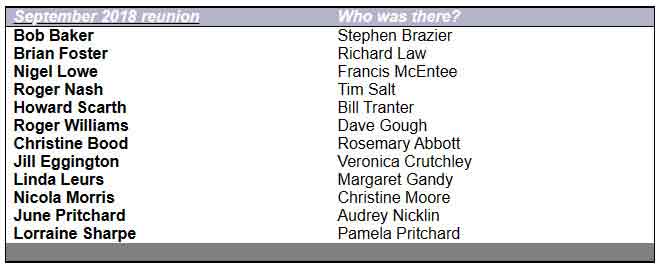
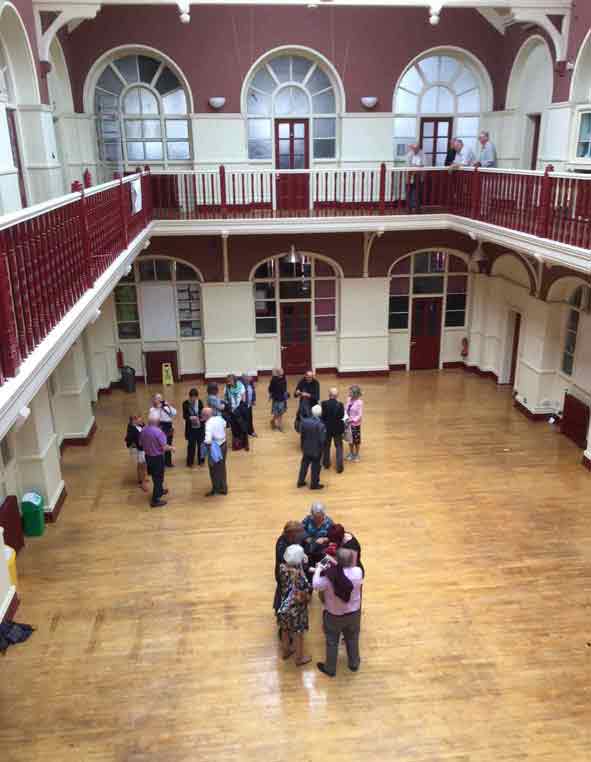
Reliving old memories in the school hall
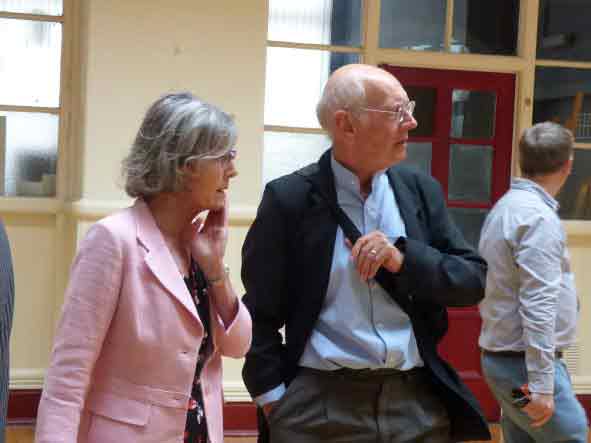
Pamela Warren ( nee Pritchard) and Steve Brazier
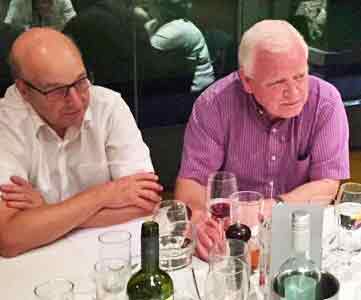
Bill Tranter and Roger Nash
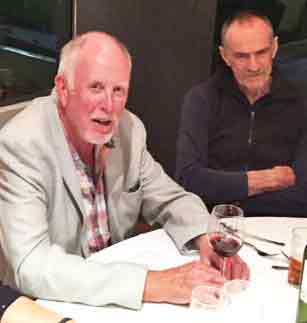
Bob Baker and Frank McEntee
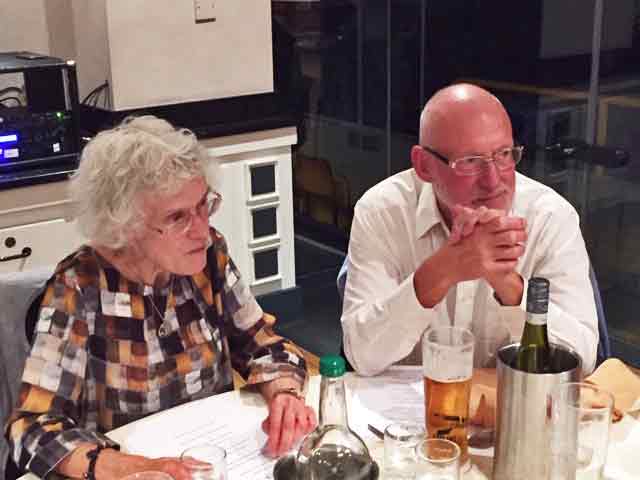
Rosie Hogg (nee Abbott) and Howard Scarth
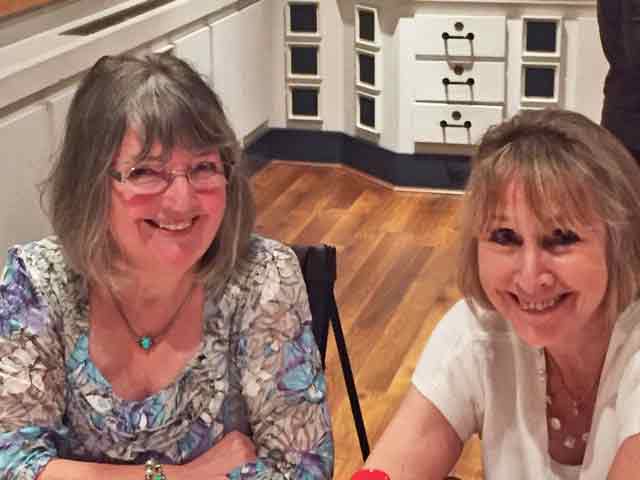
Linda Tranter (Leurs) and Nikki Edge (nee Morris).







